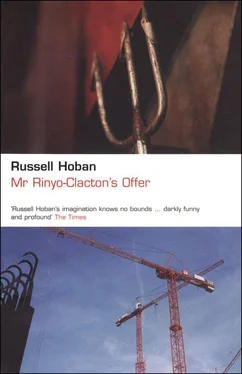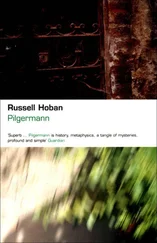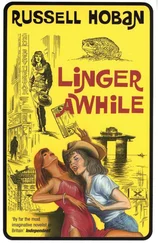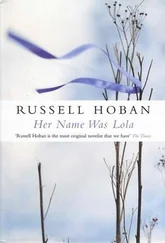Russell Hoban
Mr Rinyo-Clacton's Offer
‘Things don’t end; they just accumulate.’
Jonathan Fitch

He was in formal gear, black tie. A tall man and broad, rosy cheeks, sparkling eyes, military moustache, black hair greying at the temples — early fifties was my guess. Looked posh, looked like a man who was used to the best of everything. My vision was a little unreliable but he was in sharp focus, coming up the stairs towards me with an interested expression on his face. This was in the tube station at Piccadilly Circus and I was sitting on the floor in the corner at the top of the stairs where you go down to the left for the eastbound platform and to the right for the westbound. The prevailing smell was of hamburgers and frying. With the sound of many footsteps the world went past me coming and going. In a poster on the wall a large black rugby player hurtled towards me at full speed. ‘IMAGINE A TRAIN HURTLING TOWARDS YOU AT FULL SPEED,’ said the poster. ‘NOW DOUBLE IT.’
Mr Best-of-Everything stopped in front of me. ‘No instrument,’ he said. Big voice and he talked like a BBC correspondent, Martin-Bell-in-Sarajevo sort of thing. ‘Nothing for coins to be dropped into, so you’re not busking. Are you begging?’
‘No.’ I wasn’t sure why I was there. I’d been drinking a lot since Serafina left and I sometimes found myself doing odd things in unexpected places.
‘Thinking about the Big What-Is-It, are you?’
‘What’s the Big What-Is-It?’
‘You tell me.’
‘I don’t think I want to.’
‘Perhaps another time.’
‘Are you cruising or what? Do I look like a bit of rough to you?’
‘You look like a bit of misery. If you fancy a chat we could meet this evening at the opera. They’re doing Pelléas with Celestine Latour — best Mélisande since Mary Garden. Turn up around seven and an usher will show you to my box.’ He took a card out of a silver case and handed it to me.
‘Why me?’ I said. ‘What do you want?’
‘Come to the opera and we’ll talk about it.’
‘Which opera? Covent Garden or the ENO?’
He winced. ‘Please — the idea of Pelléas in English is abhorrent. Must go now. See you later. Or not, whichever.’ In the fresh breeze he made as he passed me I smelled money and something else, medicinal and disciplinary, that I thought of as bitter aloes. As far as I know I’ve never smelled bitter aloes but the name suggests the smell I have in mind. The card said, in an elegant little typeface:
T. Rinyo-Clacton
Long black hair. Sometimes it fell across her face like a raven’s wing. Even in repose she seemed to be standing on some bleak northern strand, howling at the grey waves with her hair whipping in the wind. There is a Scottish expression: ‘to dree one’s weird’. To undergo one’s destiny is what it means and you could see that happening in the long beauty of her face that was sometimes softly rounded and sometimes like the blade of a knife. Her great dark eyes under the flare of their black brows seemed always to be looking into a darkness beyond the light; her elegant mouth seemed murmurous with spells, succulent with kisses, speechless with sadness. She bought her clothes at cancer and multiple-sclerosis charity shops — droopy jumpers and long swinging print skirts worn with steel-toed boots. She looked thin in her clothes but the nakedness of her long body offered surprising curves and pearly roundnesses, aloof and exciting. So beautiful and strange she was, my Serafina, so magical. How could I have hoped not to lose her!
‘Sexiest voice in the business, that Latour,’ said Mr Rinyo-Clacton. ‘So mysterious, her Mélisande, so haunted and haunting, so full of death! First words out of her mouth are “Ne me touchez pas!” Don’t touch me! But she’s expecting to be touched, she’s a kind of touchstone — people reveal themselves by what they do with her; she seems so vulnerable that she makes things happen. She’s afraid that Golaud is going to tear her clothes off and have her right there by the pool in the wood; maybe in some way she even wants it, who knows? Why is she crying when we first see her? What was done to her before Golaud found her by the pool? What about that golden crown glimmering under the water, eh? Is that her lost virginity or what?’
Although I’d heard bits of Pelléas et Mélisande here and there I rarely went to the opera and I’d never seen it before or read anything about it. Seeing it now from Mr Rinyo-Clacton’s box I found that the story, the music, and the staging took me to a place where I couldn’t be sure of anything; all of it seemed to be speaking to me in a way that I didn’t understand. The dark wood through which Golaud followed a trail of blood, the pool by which Mélisande huddled so pitifully — the look of them troubled me.
With the help of the surtitles I followed the action carefully. When Golaud asked her if anyone had hurt her Mélisande said, ‘Everyone,’ and I felt guilty; she looked like Serafina. What had they done to her? She didn’t want to say. She said her golden crown had fallen into the water. Golaud said he could see it glimmering down there and it was very beautiful. Where had she got it? He’d given it to her, she said. Who? Her answer to that was that she didn’t want it. Golaud noted that the pool wasn’t very deep and he could easily reach in and retrieve it but Mélisande threatened to throw herself into the water if he did — not much of a threat really, if the water was that shallow.
Golaud kept trying to find out where she’d come from but he couldn’t get a straight answer out of her. She said she’d run away, that she was cold, that she’d come from far away. She marvelled at his grey hair, she asked if he was a giant. Partly she acted as if she could be picked up but she also behaved like an animal wary of traps.
When Golaud suggested that she come with him she said she’d rather stay alone in the wood. When he asked her a second time she said, ‘Where to?’ He said he didn’t know, that he too was lost. Then she went with him. The music had murmured and surged like the sea, full of darkness and death.
‘What do you think of it so far?’ said Mr Rinyo-Clacton.
‘Golaud isn’t right for her,’ I said.
‘That’s why it isn’t called Golaud et Mélisande,’ he said. Sparkling and rosy-cheeked Mr Rinyo-Clacton with his silver card-case, slurping oysters and sipping Cristal ‘71, a champagne so far beyond my means that I’d never even heard of it. And I, too, sipping Cristal ’71 and slurping oysters that smelled of the sea in Mr Rinyo-Clacton’s crimson and gilded box at the Royal Opera House, our refreshments catered by his minder with hands that looked capable of crushing a skull like a walnut. He also was in formal attire and almost invisible in his attendance. Except for the hands. I thought his name might be Igor but it was Desmond.
‘I have an odd collection of books,’ I said. ‘One of them is an archaeological dictionary.’
‘Ah!’ said Mr Rinyo-Clacton, squeezing lemon juice on to an oyster.
‘You call yourself Rinyo-Clacton,’ I said. The Cristal ’71 was like liquid velvet and my worods, my woordos, my words came out of my mouth in such a way that I felt entirely other than what I was used to. ‘Rinyo-Clacton is the name given to a Late Neolithic pottery style found in Scotland and in southern England.’
Читать дальше













